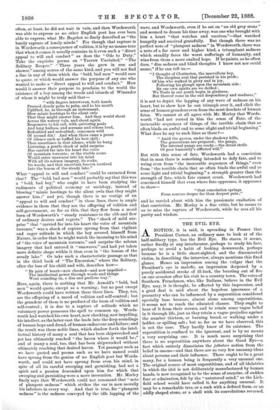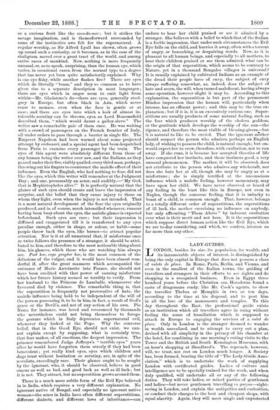THE EVIL EYE.
ANOTION, it is said, is spreading in France that President Carnot, an ordinary man to look at of the half-military type, has the Evil Eye. He stares, it seems, rather fixedly at any interlocutor, perhaps to study his face, perhaps to avoid a habit of looking downwards, perhaps because he is a little short-sighted, and the disconcerted victim, in describing the interview, always mentions this fixed glance. Hence an impression among the vulgar that the President's eye is malefic, an impression deepened by a purely accidental stroke of ill-luck, the bursting out of fire on one occasion after his visit to a country town. The votes of Southern Frenchmen, who, like Italians, believe in the Evil Eye, may, it is thought, be affected by this impression, and a good deal is said about the hopeless ignorance of a peasantry who can be influenced by a superstition considered specially base because, almost alone among superstitions, it seems not to reach the educated classes. They ought to hear of it from their nurses, and to retain some vagae belief in it through life, just as they retain a vague prejudice against the number thirteen, or burning bread, or walking under a ladder, or spilling salt ; but so far as we have observed, this is not the case. They hardly know of its existence. The superstition is confined to the ignorant, and is by no means a very surprising one. It is much more surprising that there is no superstition anywhere about the Good Eye—a fact which entirely dissociates the jettatore notion from the belief in omens—and that there are so very few uncanny ideas about persons and their influence. There ought to be a great many, for a human being is frequently a very unusual one. The original source of most superstitions, and of all idolatries in which the idol is not deliberately manufactured by human hands, is now recognised to be the sense of surprise, of sudden fear or admiration, felt by the "untutored mind," as the Lich- field school would have called it, for anything unusual. It may be a remarkable tree, or a rock with a defined form, or an oddly shaped stone, or a shell with its convolutions reversed, or a curious fruit like the coco-de-mer ; but it strikes the savage imagination, and is thenceforward surrounded by some of the instinctive awe felt for the supernatural. A regulqr worship, as Sir Alfred Lyall has shown, often grows up round such a curiosity, or it becomes, as in the case of the shaligram, sacred over a great tract of the world, and among entire races of mankind. Now, nothing is more frequently unusual, or, so to speak, surprising, than the human eye, which varies, in occasional eases, from the normal type to a degree that has never yet been quite satisfactorily explained. Why is one eye fishy, while another flashes fire ? There are eyes which do literally "beam," and they so common as to have given rise to a separate description in most languages ; there are eyes which in anger seem to emit light from within—Mr. Gla,dstone's do—there are eyes, generally steel- grey in Europe, but often black in Asia, which never cease to menace, even when the face is gentle or at ease ; and there are eyes into which a look of almost in- tolerable scrutiny can be thrown, eyes, as Lord Beaconsfield described them, "which would daunt a galley-slave." The writer saw a remarkable pair of them once. He was waiting with a crowd of passengers on the French frontier of Italy, all under orders to pass through a barrier in single file. The Emperor Napoleon had been warned about some projected attempt by carbonari, and a special agent had been despatched from Paris to examine every passenger by the train. The eyes of this agent were absolutely different from those of any human being the writer ever saw, and the Italians, as they passed under their fire, visibly quailed, every third man, perhaps, throwing out his fingers to counteract the malefic effect of their influence. Even the English, who had nothing to fear, did not like the eyes, which this writer will remember at the Judgment Day ; and one, presumably an actor, said audibly,—" My God, that is Mephistopheles alive !" It is perfectly natural that the glance of such eyes should create and leave the impression of surprise, and the belief that they cause injury to those on whom they light, even when the injury is not intended. That is a most natural development of the fear the eyes originally produced, and is, of course, much intensified whenever, rumour having been busy about the eyes, the malefic glance is expected beforehand. Such eyes are rare ; but their impression is diffused and exaggerated till it is transferred to any eyes peculiar enough, either in shape, or colour, or habit—some people throw back the eyes, like horses—to attract popular attention. Nor is it at all unnatural that, if misfortune once or twice follows the presence of a stranger, it should be attri- buted to him, and therefore to the most noticeable thing about him, his glances, which those who are watching him always see. Post hoc, ergo propter hoc, is the most common of the delusions of the vulgar, and it would have been almost won- derful if, after the great massacre which accompanied the entrance of Marie Antoinette into France, she should not have been credited with that power of causing misfortune which her future history seemed so terribly to verify. From her husband to the Princess de Lamballe, whomsoever she favoured died by violence. The remarkable thing is, that the superstition is frequently not provocative of hate, the malefic influence being held to be independent of the will of the person possessing it, to be in him, in fact, a result of God's grace or the Devil's, and not of any action of his own. Pio Nono, for instance, was loved and reverenced by thousands who nevertheless could not bring themselves to forego the gesture which in Italy deprecates supernatural evil, whenever they looked at the Pope. Why the converse belief, that in the Good Eye, should not exist, we can- not explain except by supposing, what is certainly true, that fear makes, of all emotions, the deepest impression. The prisoner remembered Judge Jeffreys's "terrible eyes" years after he would have forgotten them utterly if they had been benevolent ; yet really kind eyes, eyes which children and dogs trust without hesitation or scrutiny, are, in spite of the novelists, exceedingly rare. Their glance ought to be sought by the ignorant, who, it should be observed, believe in good omens as well as bad, and good luck as well as ill luck ; but it is not. They attract, but no superstition grows around them.
There is a much more subtle form of the Evil Eye believed in in India, which requires a very different explanation. No ignorant native of Bengal, and especially no ignorant native woman—the sexes in India have often different superstitions, different dialects, and different laws of inheritance—can endure to hear her child praised or see it admired by a stranger. She believes with a belief to which that of the Italian is a feeble impression, that under such circumstances the Evil Eye falls on the child, and hurries it away, often with a torrent of angry, or beseeching, or despairing words. Now, as it is pleasant to all human beings, and especially to all mothers, to hear their children praised or see them admired, what can be the origin of that superstition, which seems to be contrary to Nature, yet in a thousand Bengalee villages is universal ? It is usually explained by cultivated Indians as an example of the dread their people have of envy, the subject of envy always suffering somewhat, as, indeed, does the subject of hate and scorn, the will, when turned maleficent, having always some operation, however slight it may be. According to this explanation, the superstition is but part of the permanent Hindoo impression that the human will, particularly when intense, has an effluent power ; and this may be the true ex- planation ; but if it is, it is an excessively curious one. Super- stitions are usually products of some natural feeling, such as the fear which produces worship of the cholera goddess, or the gratitude which develops the worship of the sun—the ripener, and therefore the most visible of blessing-givers—but it is natural to like to be envied. That the ignorant mOther should suspect the person who admires, perhaps an English lady, of wishing to possess the child, is natural enough ; but onc would expect her to crow, therefore, with exultation, not to run away. If she runs, it is because her accepted theories of life have conquered her instincts, and those instincts good, a very unusual phenomenon. The mother, it will be observed, does not attribute to the person who admires any witchcraft, nor does she hate her at all, though she may be angry as at a misfortune ; she is simply terrified at the unconscious influence which a malefic feeling, however momentary, may have upon her child. We have never observed or heard of any feeling in the least like this in Europe, not even in Naples, though the converse feeling, that it is unlucky to boast of a child, is common enough. That, however, belongs to a totally different order of superstitions, the superstitions of ill luck, the mother exercising no influence on anybody, but only affronting "Them Above" by indecent exultation over what is their merit and not hers. It is the superstitions which suppose direct human action like the Evil Eye, which we are to-day considering, and which, we confess, interest us far more than any other.











































 Previous page
Previous page